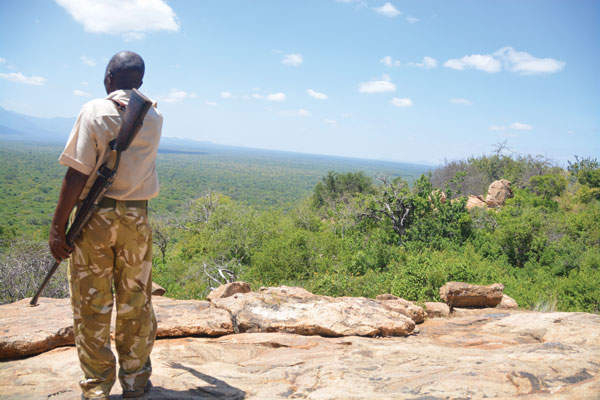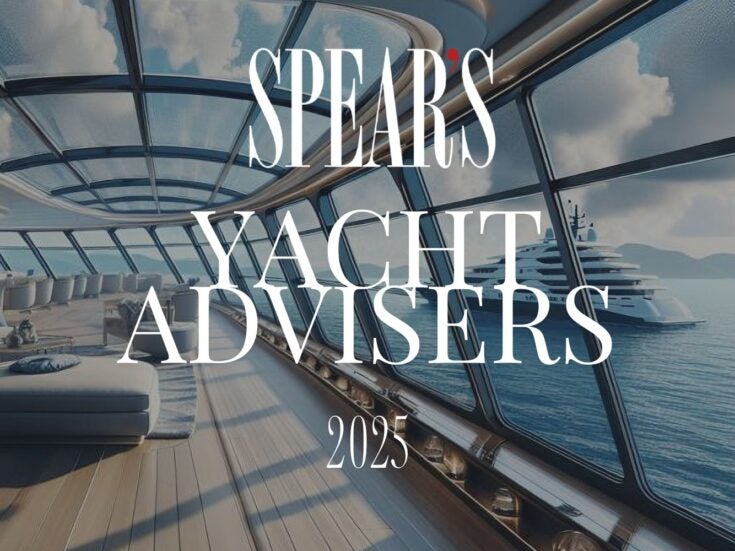

To my left, a 30-year-old woman is eating crocodile meat and ox testicles for her birthday meal. I’m sitting in Nairobi’s Carnivore restaurant, reflecting on a two-week ranger-training course out in the wilds of Africa, while chasing the token vegetarian option around my plate. To my right, with the causal air of one checking an umbrella into a cloakroom, my host, Richard Corcoran, is begrudgingly relinquishing his bolt-action rifle to a waiter. Big-game hunting may be off limits in Kenya, but everything else here is firmly in the crosshairs and on the menu.
John Mutiso Kyeli, who works for Corcoran as chief game warden at the Mbulia Conservancy, which overlooks Kenya’s Tsavo West region, does not have time for luxuries like long lunches with journalists in the capital. Instead he spends his days prowling the area’s rocky, unforgiving landscape with even more poise and vigour than his platoon of a dozen crack rangers, all of whom — aged between 23 and 28 — are around 40 years his junior. Lean and limber, he clearly eats less red meat than his employers.
Before moving to Mbulia in 2011, Mutiso spent 35 years as a Kenya Wildlife Services ranger — the country’s ‘thin green line’ in the war against poaching — and he has the scars to prove it. During a walking patrol to teach me how to seek out and remove animal snares, we pause momentarily to shelter from the scorching midday heat; here Mutiso props his vintage shotgun up against a shady cliff face and rolls up a trouser leg to show me the wounds he’s received from poachers’ bullets on his calf, then on to an angry-looking fissure on his thigh from the very horns of the wildlife he’s out here to protect. At his hip hangs a well-worn semi-automatic pistol.
I offer him some water, but John refuses: ‘I never drink on patrol,’ he confides. ‘Once we were tracking some poachers and they poisoned a water hole with insecticide because they knew we had to pass that way. Four men died because of the poison, and I was two months in hospital. The poachers returned armed, and ambushed us while we were burying their bodies, killing another eight.’
You might assume this incident was anomalous and isolated but, according to figures from the International Ranger Federation, at least 102 park rangers were killed in the line of duty around the world in 2013. Fuelled by the demand for exotic animal parts for superstition-based traditional Chinese medicines, organised criminals and militia involved in the illegal wildlife trade were responsible for 69 of those deaths.
With a single elephant yielding up to 10kg of ivory with a market value of $30,000, it’s no surprise that the poverty-stricken are turning to poaching and see these lumbering, grey beasts as ‘walking banks’. Indeed, at least 23,000 elephants have been illegally killed in Africa in the past year alone. The only thing standing between these creatures and extinction is rangers like Mutiso.
As I level John’s trusty blunderbuss at a punctured jerry can, nestled among dense forest on a makeshift shooting range just outside of Mbulia’s Kipalo Hills lodge, I consider myself fortunate to be under the watchful gaze of such an experienced instructor. Actually, we’re lucky he’s still with us at all, given the fate of so many of his colleagues.
I pull the trigger, there’s a deafening crack, the petrol container disappears, and the museum-piece shotgun blasts about 50 per cent of the shell’s kinetic energy into my biceps, throwing me backwards. When, after a few seconds, my hearing returns, the ringing in my ears is accompanied by Mutiso’s melodious laughter as he takes the gun from me, tucks it neatly into his shoulder and shows me how it’s done with military precision.
Mutiso and his team of rangers aren’t out here collecting camping fees and picking up litter, they’re a militarised unit, armed and prepared to shoot to kill. For a fee, you can train alongside them. Liberty Africa Safaris, of which Corcoran is a director, runs a two-week ranger training course for guests who want to get a better understanding of Kenya’s wildlife ecosystem and enrich their safari experience through elements of guide training skills.
In practice, this involves hurtling around the Masai Mara in a 4×4; skimming along the Tana River Delta in a speedboat; learning how to ventilate poachers with a 9mm handgun in Tsavo’s wild, wild west; and sneaking up on dangerous game with the ultimate goal of avoiding evisceration as a prize — all while dressed in a snazzy ranger’s uniform that becomes your property when you’re awarded your certificate of course completion.
‘At some point or another in a guide’s life he will be confronted by a situation involving a dangerous animal, and one needs to know how to deal with it,’ explains Corcoran, ‘so we teach the guests tracking skills to locate game, approach it and leave the sighting without having disturbed the creature.’
Starting out in the swanky Serian safari lodge in the Mara North Conservancy — the type of place that affects the illusion of wilderness camping by stretching canvas overhead, while underfoot lie dark wood decking and expensive throw rugs — guests are taken out on to a private corner of what must be the world’s best-known wildlife reserve and taught orienteering skills to navigate these vast lands using only natural landmarks for reference.
Finding one’s lunch venue depends upon trainees being able to use the new skills to locate Serian’s well-equipped mobile camp. Those who aren’t too hot with a map had best pay close attention during the bush survival skills section, which covers finding food and water in the wilderness and making fire, as well as dealing with snake bites and using medicinal plants.
Here we also learn off-road driving techniques, including tackling large obstacles and winching our bogged vehicles to safety while, in contrast, the course concludes at Delta Dunes — the equivalent of a Flintstones-era five-star hotel, crafted from flotsam, driftwood and elephant bones, that’s so remote you have to take a boat to reach it — where you’ll be taught how to sail by the stars and master knots, tides and currents. Throughout the course, we study plant recognition, mammal behaviour and how to correctly interact with the wildlife of each visited region.
Some of the rules immediately go out of the window. A zebra dips her muzzle into my cupped hands and drinks water from them by the side of a dirt road leading to Kipalo Hills, the second of the three barefoot-luxury lodges on our Kenyan itinerary. The remains of a dried umbilical cord hanging from her distended belly tells me she’s still a baby, only a week old, but she won’t be getting much older.
For a wild animal, and a foal at that, to seek out human contact in the African savannah is unusual behaviour, but lacking her mother to feed, teach and protect her, she knows she won’t last long without help — and I’m more than happy to provide it.
I implore my guides to take her back to the lodge and nurse her into adulthood, to no avail: ‘She’ll likely be eaten by lions,’ I’m told as I drive away, trying not to watch the feeble zebra in the rear-view mirror as it clumsily gallops after our vehicle. ‘We’re not allowed to interfere,’ Corcoran continues, ‘and why should we? This is nature.’
We’re so used to seeing these animals mollycoddled in wildlife parks that it’s sometimes hard to believe that the fantastic creatures right in front of you in Kenya are truly wild and part of an aggressive food chain. It can be harder still when the people who want to protect their existence are seemingly apathetic towards their plight, but Corcoran is right. The zebra is a lion’s dinner and, in turn, big cat numbers are dwindling because of the ultimate predator: us.
Although my battle to save the zebra is lost, Mutiso’s war rages on.
Contact Liberty Africa Safaris on ops@libertyafrica.com for quotations and bookings.






